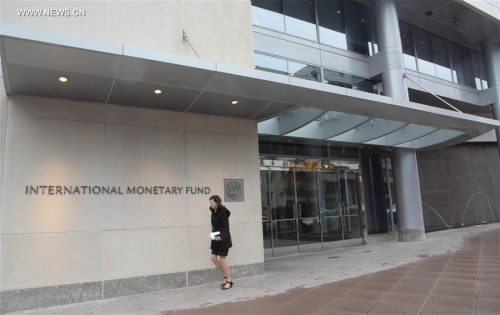
Photo taken on Nov. 30, 2015 shows a woman walking past the headquarters of the International Monetary Fund (IMF) in Washington D.C., the United States. (Photo: Xinhua/Bao Dandan)
Lundsager, the former U.S. executive director at the IMF, also argued that she would rather view the yuan's inclusion as a "fact-based move which features a currency from a large economy with an increasing role in the global market that is included."
"What is important is the data. I expected the IMF board will agree with the IMF Managing Director and staff that the yuan is qualified to be included in terms of data and fact," she said.
TOUGH JOURNEY AHEAD
China started promoting RMB's internationalization since 2009, which has grown at a pretty brisk pace over the past two years, President and CEO of Bank of China USA Chen Xu told Xinhua.
The internationalization of a country's currency usually involves three phrases: being used as an international trade settlement currency, turning into an investment currency, being treated as a reserve currency.
"The inclusion of RMB into the SDR basket shows that the internationalization of the currency has entered into the third phrase, and the process is expected to pick up pace," he added.
Gaining the status of a reserve currency will prompt central banks to increase their holdings of the yuan in the reserve currency portfolio. Private sectors will also be encouraged to gradually buy more yuan-denominated assets.
The global reserve currency status, however, will not automatically turn the yuan into a major global reserve currency, which is a choice of the market.
Lardy, the senior researcher with the Washington-based Peterson Institute of International Economics, said there are a few central banks that hold their reserves in proportion to the weight in the SDR basket. They tend to be very conservative and would adjust their portfolio in a very gradual manner.
"If yuan wants to gain the trust and confidence of the market, China needs to become an economy and a financial system that can accept large and free movement of inflows and outflows and has depth and breadth with a variety of financial instruments," Lundsager said. "So it's very important to keep China on path of reform. It's tough that everything you do is closely scrutinized by the market. But China can't backtrack in a major way. Inclusion will re-enforce the trend."


















































